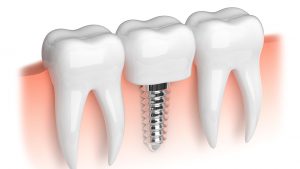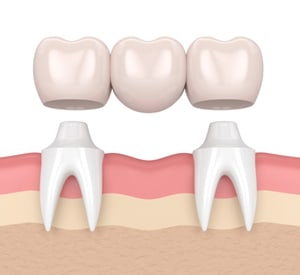In the hands of a top cosmetic dentist, bridges are among the most effective dental restorations in the world. Custom-crafted to match the teeth in appearance and function, bridges can provide a durable, aesthetically-pleasing replacement for one or more missing teeth. In addition to facilitating everyday processes (e.g. speaking and eating) and enhancing the appearance of the smile, bridges can prevent complications associated with missing teeth, including shifting of the teeth into the empty gap.
Dr. David R. Newkirk has almost three decades of experience creating and placing sturdy dental restorations to benefit his patients. He can determine whether a dental bridge is the right option for you after personalizing a treatment plan to suit your needs.
- What Is a Dental Bridge?
- Dental Implant vs. Bridge
- Dental Bridge Procedure
- Dental Bridges Longevity
- Dental Bridge Cost
- additional faqs
What Is a Dental Bridge?
A traditional fixed dental bridge involves suspending a false tooth (also called a “pontic”) between two crowns. The pontic fills, or “bridges,” the gap left by the missing tooth or teeth. Other variations of this restoration exist, such as Maryland bridges (in which the pontic is supported by thin metal strips attached to the surrounding teeth) and cantilever bridges (which use only one natural tooth for support). The best type of bridge for you will depend on the location of your missing teeth, the condition of your natural teeth, and several other factors.
Dental Implant vs. Bridge
 While both bridges and dental implants can make excellent replacements for missing teeth, they have a few key differences. Unlike a bridge, which uses surrounding teeth as abutments for the pontic, a dental implant consists of a root form that is surgically placed into the jaw. The presence of the root form not only helps the result look more lifelike, but it helps create a comfortable fit and preserve the bone where the missing tooth used to be. Without the root form, that bone gets reabsorbed by the body and shrinks over time. After it heals, a false tooth is placed on the implant. The result looks very natural, and it functions much as a natural tooth does. An implant is also typically easier to clean and maintain, and there are often fewer chances for complications down the road. With a bridge, if anything happens to any one of the three teeth, such as new decay, the entire bridge has to be replaced; with an implant, for any problem with one tooth, the solution will likely involve only that tooth.
While both bridges and dental implants can make excellent replacements for missing teeth, they have a few key differences. Unlike a bridge, which uses surrounding teeth as abutments for the pontic, a dental implant consists of a root form that is surgically placed into the jaw. The presence of the root form not only helps the result look more lifelike, but it helps create a comfortable fit and preserve the bone where the missing tooth used to be. Without the root form, that bone gets reabsorbed by the body and shrinks over time. After it heals, a false tooth is placed on the implant. The result looks very natural, and it functions much as a natural tooth does. An implant is also typically easier to clean and maintain, and there are often fewer chances for complications down the road. With a bridge, if anything happens to any one of the three teeth, such as new decay, the entire bridge has to be replaced; with an implant, for any problem with one tooth, the solution will likely involve only that tooth.
That said, bridges also hold a few potential advantages over implants. After a bridge is placed, there is generally no waiting time for healing, whereas a dental implant may require several weeks to heal and require a temporary tooth during the interim. Bridges are also usually less expensive, and unlike implants, they do not typically require oral surgery.
Your ideal type of tooth replacement is contingent upon the specifics of your case. For example, if the teeth on either side of the missing tooth have large restorations or need crowns anyway, a bridge may be the most sensible option. Patients with insufficient jawbone density may also be best suited for bridges. If you are unsure whether to choose an implant or bridge, Dr. Newkirk can help you decide after a thorough evaluation of your oral health.
What Does the Dental Bridge Procedure Involve?
 Once you and Dr. Newkirk decide to move forward with a dental bridge, he will begin the procedure by preparing the adjacent teeth for dental crowns. This part of the process can involve cleaning the teeth, treating periodontal disease, or otherwise ensuring the teeth are healthy and able to support a bridge.
Once you and Dr. Newkirk decide to move forward with a dental bridge, he will begin the procedure by preparing the adjacent teeth for dental crowns. This part of the process can involve cleaning the teeth, treating periodontal disease, or otherwise ensuring the teeth are healthy and able to support a bridge.
Afterward, Dr. Newkirk will take an impression and give the case to our dental laboratory technician, who will then create the bridge according to the unique shape and shade of your natural teeth. Finally, Dr. Newkirk will cement the bridge onto your teeth using a dental adhesive, finalizing the restoration.
How Long Do Dental Bridges Last?
High-quality dental bridges can last for many years when properly maintained. Taking care of your dental bridges is usually as easy as attending your regularly scheduled cleanings and exams, brushing at least twice a day, flossing, and practicing good overall oral hygiene. Dr. Newkirk also advises you to use caution when biting down on hard foods or objects, as doing so may cause damage to your bridge.
How Much Does a Dental Bridge Cost?
The average cost of a dental bridge in the United States is approximately $4,325. Please note, however, that the precise cost will depend on a number of factors, such as:
- The type of bridge (i.e. traditional, Maryland, or cantilever)
- The number of teeth being replaced
- Additional procedures (such as periodontal treatments or removal of decay)
- Materials used to create the crowns
- Postoperative care
Our team is always happy to make the financial aspect of your care as stress-free as possible. We accept all major credit cards and most insurances and will gladly discuss your benefits with you if you have any questions.
Additional FAQs about Dental Bridges
How do I care for my dental bridge?
To care for your dental bridge, it’s important to maintain excellent oral hygiene. Brushing at least twice a day, flossing daily, attending regular dental exams and cleanings, and avoiding excessive pressure when biting should help keep your bridge in good condition.
Can I whiten my teeth after getting a dental bridge?
Teeth whitening treatments cannot brighten dental bridges the way they do natural teeth. As such, patients are generally advised to undergo teeth whitening before getting a dental bridge placed.* If you already have a bridge and want to whiten your teeth, let Dr. Newkirk know; the two of you can work these goals into your care plan.
Are dental bridges covered by insurance?
Many insurance plans at least partially cover dental bridges. With this in mind, coverage can vary widely, so it’s best to check with your insurance provider to understand your plan and any potential out-of-pocket costs. Our office is always here to help you understand your benefits, as well.
If you would like to find out if a dental bridge is right for you, please do not hesitate to contact us today.